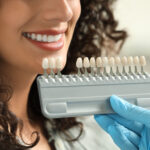Putting Helpful Bacteria to Work in Your Mouth
In recent years, the word probiotics has increased in popularity around the subject of dentistry. In part, this is due to research undertaken in the last decade that shows how probiotics help improve and maintain oral health. Let’s discuss oral probiotics and how you can benefit from them.
Bacteria as Supporting Players
Probiotics are live microorganisms — think of them as friendly bacteria. They’re already known for improving and maintaining digestive health and are a natural component of everyday living. Granted, the U.S. Food and Drug Administration (FDA) has not yet approved oral probiotics for any direct medical or dental uses. Recent studies do indicate, however, that probiotics offer benefits not only to your digestion, but your oral health as well.
At any given time, the different types of bacteria in the human mouth range into the hundreds (making up your oral biome), all battling for the finite room and resources in your mouth. A regular intake of probiotics brings in healthy bacteria that compete for available space and resources, without causing harm to your oral tissues and teeth. Certain probiotics even target harmful bacteria directly, preventing them from causing further decay.
Benefits of Dental Probiotics
Research continues, but here are some of the benefits of known oral probiotics:
Plaque prevention – A study from 2016 showed that a probiotic strain called A12 fights a bacteria called Streptococcus mutans, the primary tooth decay bacteria. The A12 strain prevented the harmful bacteria from creating plaque.
Reducing bad breath – Another study tested the use of probiotics against a placebo in an organized test group. At the end of 3 days, 85 percent of the subjects taking the probiotic had significant reductions in the bacteria that cause bad breath.
Fighting gingivitis – Other studies in 2006 and 2007 resulted in 59 people with gum disease showing a reduction in tissue inflammation and gum bleeding, as well as less plaque, with the introduction of dental probiotics.
Preventing oral cancer – Although still under research, studies have shown certain probiotics reduced oral cancer in rats.
Bone Repair – A report from the Journal of Indian Society of Periodontology concluded that probiotics stimulate bone formation, helping repair bone loss from advanced forms of gingivitis.
Common Probiotic Sources
Probiotics are available in supplement form but also occur naturally in certain foods. These products may or may not include the specific type of oral bacteria used in the above studies, but they may include bacteria that challenge harmful bacteria for dominance in your mouth.
- Yogurt
- Soft cheeses, like cottage cheese
- Buttermilk
- Kefir
- Sour pickles
- Sauerkraut
- Sourdough bread
- Kimchi
- Miso
- Raw oats
- Unrefined barley or wheat
Another excellent probiotic source is a fermented tea called kombucha, which comes in a variety of chilled flavors at your local market. Its popularity is increasing every year, and it’s also fun to say. Kombucha!
A Word of Caution about Probiotics
If you choose to increase your body’s supply of probiotics, be careful how much. Too much of anything good – even tooth brushing – can result in harm instead of help. The same is true with probiotics. Pregnant women, older ones, young children, and individuals with a high risk of infection should consult a medical practitioner to discuss how much probiotic intake, if any, is safe for their circumstances.
The Placerville Dental Group strives to keep your oral health and safety in mind. If you have any further questions about probiotics or would like to discuss your favorite brand of kombucha, please bring up the subject at your next appointment. If you do not have one scheduled yet, use our online form to set one up or give us a call. We’re happy to help you maintain your oral health!



Based on this article, Can you recommend an oral pro-biotic?
A varied healthy diet and regular oral hygiene should suffice in maintaining a normal and healthy flora of microorganisms in the mouth and GI. That being said, if antibiotics are taken or a person is immune compromised, some opportunistic organisms can flourish, such as candida, causing a yeast infection. Addressing the cause of the problem, then eating healthy combined with regular oral hygiene, a normal flora will re-establish itself. See your dentist and dental hygienist!